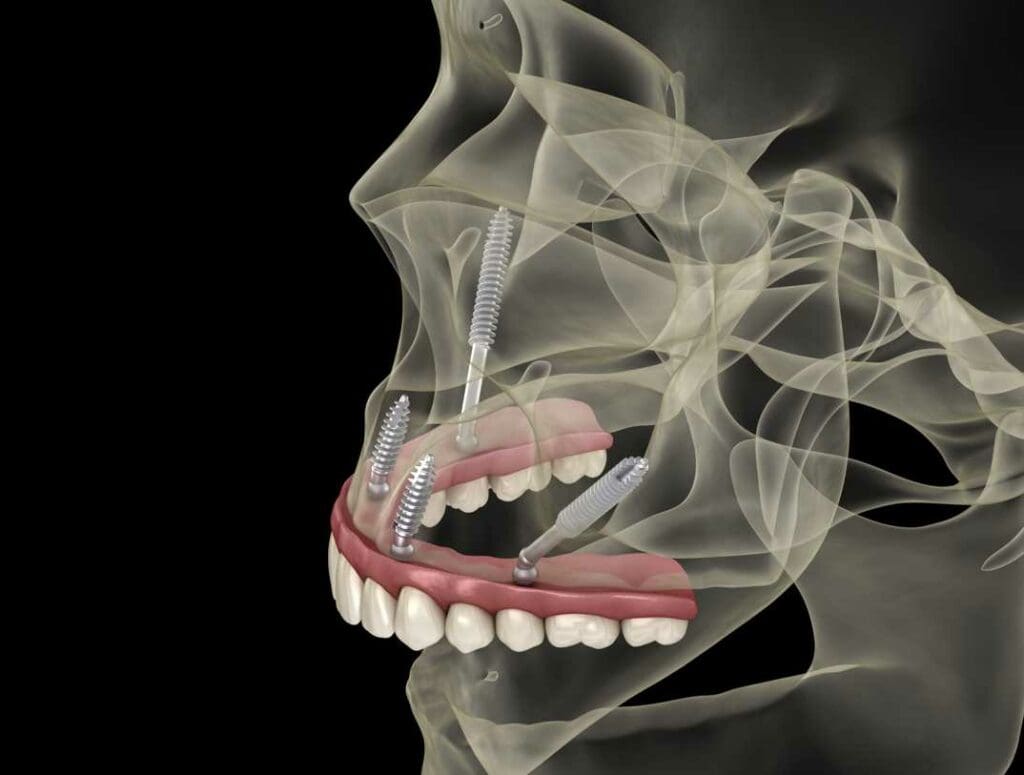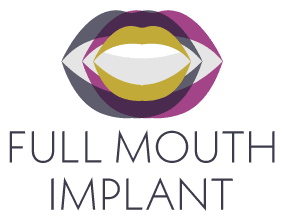Pterygoid Implants
Advanced Missing Teeth Solutions for those with minimal jawbone
Pterygoid Implants
Pterygoid implants are placed at the junction of maxillary (upper jaw) bone and pterygoid process of the sphenoid bone. Pterygoid implants are considered when inadequate bone is present in the posterior maxilla, as an alternative to osseous augmentation to permit implant placement.
The primary advantage of using pterygoid implants is that the density of bone in this area affords good anchorage potential, which may be superior to that of any other part of the maxilla. These implants provide the same stability and function as an implant embedded into the jaw.
What are Pterygoid Implants?
Zygomatic implants are dental implants that are attached to the cheekbone instead of the jawbone. They are longer than conventional dental implants and are placed at an angle, allowing them to maximize the robust structure of the zygomatic bone (more commonly known as the cheekbone). On the other hand, pterygoid implants (also referred to as tuberosity implants or pterygo-maxillary implants) are embedded into the medial pterygoid plate that is located just behind the jawbone.
Both zygomatic and pterygoid Implants can be used in cases where there is significant jawbone deterioration, resulting in the unlikelihood of dental implants being inserted successfully. These implants are both longer than traditional dental implants and are embedded at an angle into the cheekbone and pterygoid plate behind the jawbone. The locations where these implants are placed are not affected by the bone shrinkage that comes with long-term tooth loss, so the implants will still be strongly anchored by ample bone quality and structure.
Why are Pterygoid Implants Used?
- To anchor a fixed dental bridge into the upper jaw – Zygomatic and pterygoid implants are used together to secure a dental bridge permanently in place onto the upper jaw. The implants are embedded into the cheekbone and pterygoid plate in angled positions to maximise the existing bone structures.
For a successful smile rehabilitation even with severe jawbone shrinkage – Pterygoid and zygomatic implants make it possible for the entire upper arch of teeth to be restored with an implant treatment even with considerable jawbone loss. This is because the areas where the implants are placed (the cheekbone and pterygoid plate) are not affected by jawbone atrophy, allowing the artificial tooth roots to have the strong support they require to keep the teeth restorations permanently in place.
To avoid the need for a bone graft or sinus augmentation – Augmentation procedures on the jawbone and sinus areas may be needed prior to dental implant placement in case of bone deterioration. These procedures are not required anymore if pterygoid and zygomatic implants are used, since both of them are placed in areas of dense bone quality that are not disturbed by jawbone shrinkage.
As part of All-on-4 dental implant treatment – Zygomatic and pterygoid implants are used together for All-on-4 treatment. This procedure involves using 2 zygomatic implants that are inserted into the cheekbone along with 2 pterygoid implants that are placed into the pterygoid plate (behind the jawbone). These 4 implants are attached to a fixed dental bridge on the same day, making it possible for the entire upper arch of teeth to be rehabilitated without the patient enduring a toothless period or a lengthy healing phase for the dental implants.
Who is the Treatment For?
Zygomatic and pterygoid implants are suitable for patients who have long suffered from multiple or all missing teeth in the upper arch. Long-term tooth loss that has not been addressed with other dental implant treatments results in considerable jawbone shrinkage, making the patients unsuitable for conventional dental implants. In these cases, a treatment using zygomatic and pterygoid implants will deliver the much-needed missing teeth solutions since both types of implants are placed in locations other than the deteriorated jawbone.
These implants are for patients who prefer quick results when it comes to missing teeth solutions. The treatment using these implants together does not require a long waiting period for the titanium tooth roots to heal before the permanent teeth replacements are attached. This shortened treatment enables the smile to be restored to its former beauty and health in one day, with the implants and teeth restorations loaded within the same dental appointment.
Benefits of Pterygoid Implants
1) Improved stability: Pterygoid implants offer a high level of stability, as they are anchored in the dense pterygoid bone. This makes them a good option for patients who have experienced bone loss in the maxilla and may not have sufficient bone density for traditional implant placement.
2) Reduced need for bone grafting: Because pterygoid implants are placed in the pterygoid bone, which is often denser than other parts of the maxilla, there may be less need for bone grafting procedures to build up the bone in the area prior to implant placement.
3) Ability to support a full arch of teeth: Pterygoid implants can be used to support a full arch of teeth, which can improve a patient’s ability to chew and speak and provide a more natural-looking smile.
4) Reduced risk of sinus complications: Pterygoid implants are placed behind the maxillary sinus, which reduces the risk of sinus complications that can occur with traditional implant placement in the upper jaw.
5) Reduced treatment time: Because pterygoid implants can often be placed without the need for bone grafting procedures, the overall treatment time may be reduced, which can be beneficial for patients who want to restore their smile as quickly as possible.
It’s important to note that not all patients are good candidates for pterygoid dental implants, and a thorough evaluation by a dental professional is necessary to determine the best treatment plan for each individual.

Pterygoid Implants
Pterygoid Implants (each) £3,000
£250.00/Month (0% Interest / 12 Months)
£62.47/Month (9.9% APR / 5 Years).
Cost of Credit: £748.41. Total to pay back: £3,748.41
Book you free no-obligation consultation with x-rays
- World-class expertise to rebuild your smile
- International award winning clinic
- Natural & long-term results
- Nervous & Phobic Patient Care
- Clear written treatment plans
- In-house CT Scanner
- Support and after-care
- Treatment guaranteed

